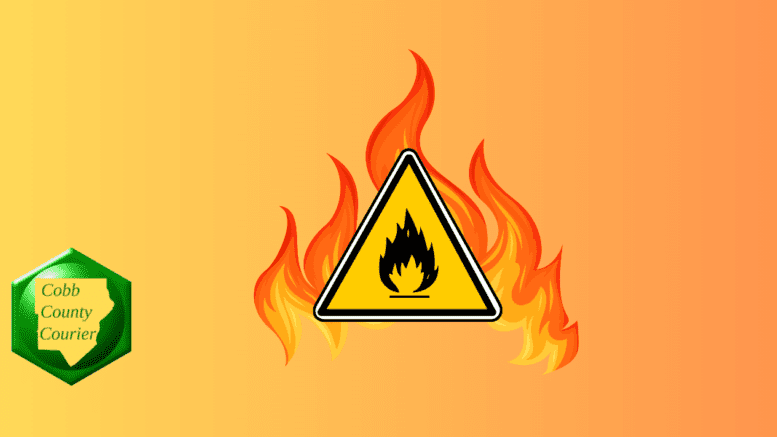The National Weather Service issued a high fire danger alert for Cobb County and other counties in the region on Friday, February 28.
A dry cold front is sweeping through the region, and the alert could be elevated to a Red Flag Warning. Dry conditions are expected to persist Saturday and might continue through Monday.
What is in the statement?
The statement gives the following details:
This Hazardous Weather Outlook is for north and central Georgia.
.DAY ONE…Today and Tonight…
High fire danger conditions are expected today due to dry fuels and
very low relative humidity. A Fire Danger Statement has been issued
for north and central Georgia for this afternoon and evening. Please
refer to your local burn permitting authorities for information on
whether or not you may burn outdoors.
.DAYS TWO THROUGH SEVEN…Saturday through Thursday…
High fire danger conditions are expected again Saturday as a dry
cold front sweeps through the area and northwest winds increase. A
Red Flag Warning may be required.
Elevated fire danger conditions may continue into Monday due to very
low relative humidity and dry fuels.
Isolated thunderstorms are possible ahead of a cold front late
Tuesday into Wednesday. A few thunderstorms may be strong.
Why does low relative humidity increase the danger of fire?
The National Park Service published the following explanation of why low relative humidity increases the danger of fires:
“Relative humidity is important because dead forest fuels and the air are always exchanging moisture. Low humidity takes moisture from the fuels, and fuels in turn, take moisture from the air when the humidity is high.
“Light fuels, such as grass and pine needles, gain and lose moisture quickly with changes in relative humidity. When the RH drops, fire behavior increases because these fine fuels become drier.
“Heavy fuels, on the other hand, respond to humidity changes more slowly. To see significant changes in heavy fuel moisture, there must be significant moisture, usually from more than a single storm.”
What counties are affected?
The following counties are included in the hazardous weather outlook:
Baldwin, Banks, Barrow, Bartow, Bibb, Bleckley, Butts, Carroll, Catoosa, Chattahoochee, Chattooga, Cherokee, Clarke, Clayton, Cobb, Coweta, Crawford, Crisp, Dade, Dawson, DeKalb, Dodge, Dooly, Douglas, Emanuel, Fannin, Fayette, Floyd, Forsyth, Gilmer, Glascock, Gordon, Greene, Gwinnett, Hall, Hancock, Haralson, Harris, Heard, Henry, Houston, Jackson, Jasper, Jefferson, Johnson, Jones, Lamar, Laurens, Lumpkin, Macon, Madison, Marion, Meriwether, Monroe, Montgomery, Morgan, Murray, Muscogee, Newton, North Fulton, Oconee, Oglethorpe, Paulding, Peach, Pickens, Pike, Polk, Pulaski, Putnam, Rockdale, Schley, South Fulton, Spalding, Stewart, Sumter, Talbot, Taliaferro, Taylor, Telfair, Toombs, Towns, Treutlen, Troup, Twiggs, Union, Upson, Walker, Walton, Warren, Washington, Webster, Wheeler, White, Whitfield, Wilcox, Wilkes, Wilkinson
What precautions should be taken?
The National Weather Service recommends extreme caution if you do outdoor burning during high fire danger conditions, and that you check your local fire ordinances.
>> To read a summary of Cobb County’s fire ordinances follow this link
About the National Weather Service
The National Weather Service (NWS) is a part of the National Oceanic and Atmospheric Administration (NOAA).
The NWS describes its role as follows:
“The National Weather Service (NWS) provides weather, water, and climate forecasts and warnings for the United States, its territories, adjacent waters and ocean areas, for the protection of life and property and the enhancement of the national economy.
“These services include Forecasts and Observations, Warnings, Impact-based Decision Support Services, and Education in an effort to build a Weather-Ready Nation.
“The ultimate goal is to have a society that is prepared for and responds to weather, water and climate events.”
Read all the Cobb County Courier climate and weather coverage by following this link.
